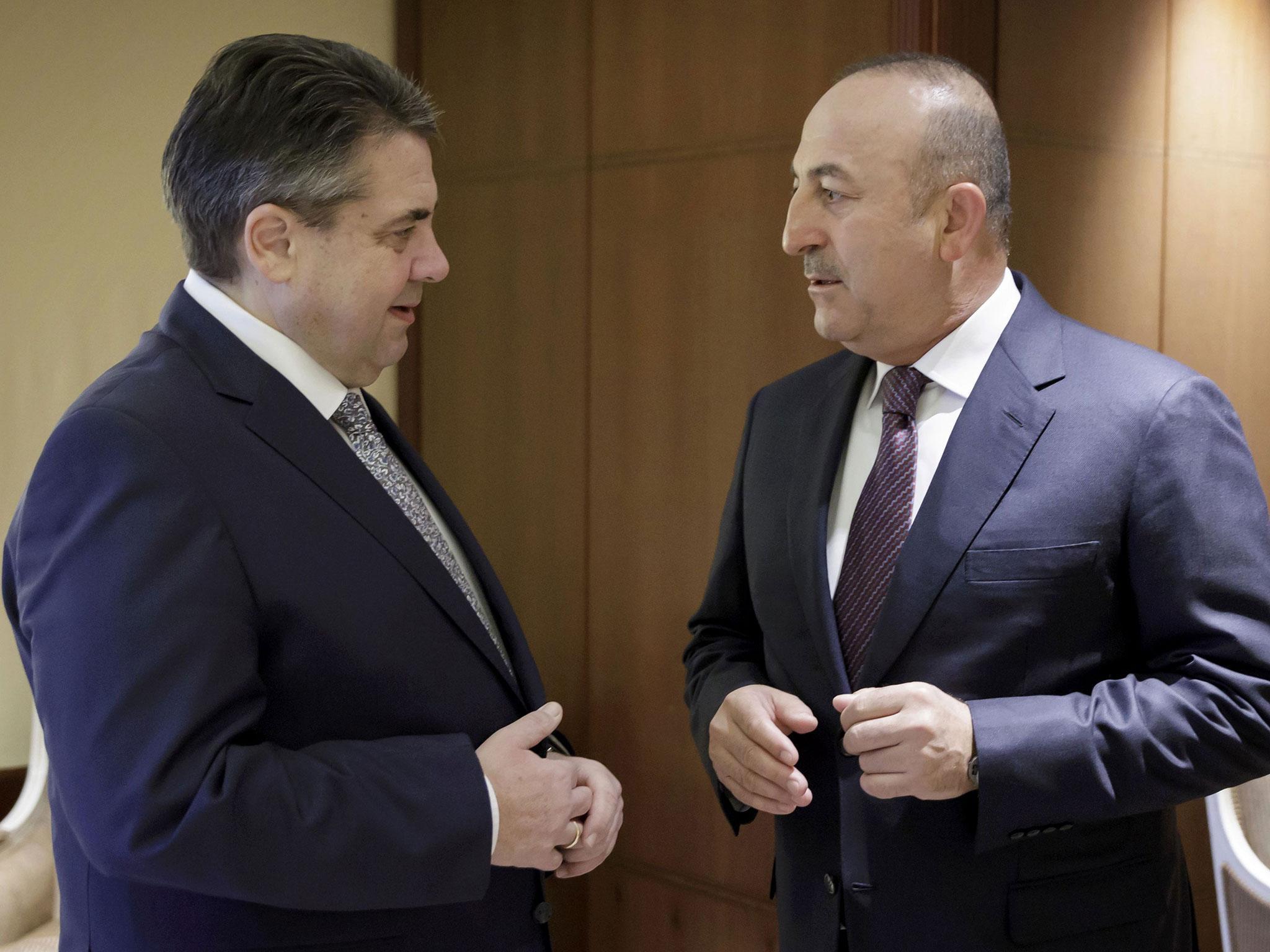Germany 'must decide if Turkey is a friend or not', Turkish foreign minister says
Mevlut Cavusoglu repeated the Turkish President’s assertion that Germany’s ‘practices are similar to those of the Nazi era’

Germany must decide if it is friends with Turkey, the Turkish foreign minister has said, after a breakdown in diplomatic relations that culminated in Turkish President Recep Tayyip Erdogan accusing Germany of “Nazi practices”.
Germany’s foreign minister Sigmar Gabriel said talks with his Turkish counterpart Mevlut Cavusoglu were “good, honest and friendly, but also hard and contentious”.
However, Mr Cavusoglu said although Turkey wanted to remain friends with Germany, “Germany must decide if Turkey is a friend or not”. He said Turkey would then take steps accordingly.
The talks come after German municipalities cancelled several rallies in support of a Turkish referendum to give Mr Erdogan sweeping new presidential powers.

Some rallies have gone ahead, with Mr Cavusoglu himself addressing a crowd in Hamburg and repeating Mr Erdogan’s assertion that Germany’s “practices are similar to those of the Nazi era”.
About 1.4 million people of Turkish descent living in Germany are eligible to vote in the referendum Turkey is to hold next month.
“There are lines that should not be crossed, and one of those is the comparison with Nazi Germany,” Mr Gabriel said.
Mr Cavusoglu’s comments echo those made over the weekend by Mr Erdogan, who said: “Germany, you don’t have anything to do with democracy. These current practices of yours are no different than the Nazi practices of the past.”
Mr Erdogan followed up his comments by saying he will “stir up the world” if he is banned from giving speeches in Germany.
“Now they think Tayyip Erdogan wants to go to Germany. I will go if I want to,” Mr Erdogan said. “If you don’t let me in, or restrain me from giving a speech, then I will stir up the world.”
Mr Cavusoglu said he had discussed a possible venue for the Turkish President’s rally in Germany with his counterpart.
It came as Dutch nationalist Geert Wilders sought to revive his parliamentary campaign by denouncing Turkey’s president as a dictator and protesting against plans for similar Turkish rallies in his country.
Mr Wilders led a small rally of a few dozen activists outside the Turkish embassy as he tried to recover from his anti-Islam Freedom Party’s slide in the opinion polls just one week before a parliamentary election in the Netherlands.
“Leave us alone, lobby in your own country, and stay away,” Mr Wilders said of Mr Cavusoglu’s plan to hold a rally in Rotterdam.
“Mr Erdogan is a mere dictator,” he added. “We would not allow lobbying for North Korea or Saudi Arabia in our country either,” he said, calling for the entire Turkish cabinet to be declared “persona non grata”.
Mr Wilders’ opposition right-wing Freedom Party, which wants to shut mosques, ban the Koran, quit the European Union and stop Muslim immigration, led opinion polls for most of last year but is now losing ground to the conservative Christian Democrats (CDA) and the far-left Socialists.
Adding to tensions, Turkey has not allowed any German consular access to a German newspaper reporter arrested in Istanbul.
Mr Erdogan has accused Deniz Yucel of being both a German spy and a “representative” of the outlawed Kurdish rebel group PKK, a claim Berlin has dismissed as “absurd”.
Mr Yucel, a reporter for Die Welt, was detained in Istanbul last month over his reports about a hacker attack on the email account of the country’s energy minister.
Mr Gabriel said he pushed for access to Mr Yucel, who has both Turkish and German citizenship, and lobbied for his release.
Even before the current rift, relations were already strained between the two countries over Germany’s criticism of Mr Erdogan’s crackdown following a failed coup as a flow of Turkish diplomats and soldiers sought asylum in Germany.
Germany has suggested it may not extradite suspects wanted by Turkey in cases it considers politically motivated, which has prompted Mr Erdogan to accuse Germany of having “become a shelter” for terrorists and having no regard for other countries’ national security issues.
Join our commenting forum
Join thought-provoking conversations, follow other Independent readers and see their replies
Comments